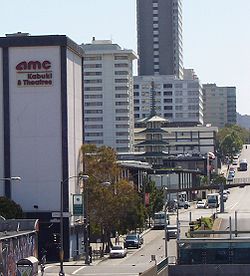Japantown, San Francisco
| Japantown | |
|---|---|
| Neighborhood | |

Japan Center of Japantown, with Peace Pagoda and the Sundance Kabuki 8 cinema complex.
|
|
| Nickname(s): Nihonmachi, Little Osaka, J-Town | |
| Location within Central San Francisco | |
| Coordinates: 37°47′06″N 122°25′47″W / 37.7851°N 122.4298°W | |
| Country |
|
| State |
|
| City-county | San Francisco |
| Government | |
| • Supervisor | London Breed |
| • Assemblymember | David Chiu (D) |
| • State senator | Scott Wiener (D) |
| • U.S. rep. | Nancy Pelosi (D) |
| Area | |
| • Total | 0.036 sq mi (0.09 km2) |
| • Land | 0.036 sq mi (0.09 km2) |
| Population | |
| • Total | 1,397 |
| • Density | 39,000/sq mi (15,000/km2) |
| Time zone | Pacific (UTC−8) |
| • Summer (DST) | PDT (UTC−7) |
| ZIP code | 94115 |
| Area codes | 415/628 |
Japantown (日本町 Nihonmachi?) (also known as J Town or historically as Japanese Town, "Nihonmachi") is a neighborhood in the Western Addition district of San Francisco, California. It comprises about six square city blocks. San Francisco's Japantown is the largest and oldest such enclave in the United States.
The main thoroughfare is Post Street, between Fillmore Street (to the west) and Laguna Street (to the east). The Japantown neighborhood is generally considered to be bordered on the north by Bush or Pine Street, and on the south by Geary Boulevard.
Its focal point is the Japan Center, which opened in 1968, and is the site of three Japanese-oriented shopping centers. The Peace Pagoda, also at the Japan Center, is a five-tiered concrete stupa designed by Japanese architect Yoshiro Taniguchi and presented to San Francisco by the people of Osaka, Japan.
Built and settled as part of the Western Addition neighborhood in the 19th and early 20th century, Japanese immigrants began moving into the area following the 1906 earthquake. (Before 1906, San Francisco had two Japantowns, one on the outskirts of Chinatown, the other in the South of Market area. After 1906, San Francisco's main Japantown was in the Western Addition, with a smaller one in the South Park area.) By World War II, the neighborhood was one of the largest such enclaves of Japanese outside Japan, as it took an appearance similar to the Ginza district in Tokyo.
...
Wikipedia

